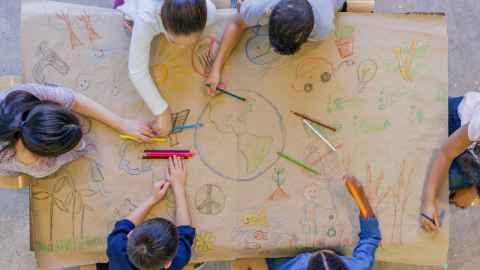Who's in and who's out? Educational exclusion on the rise
25 February 2019
In a world driven by competition and exclusion, the vision of a mainstream education system that includes students with disabilities is increasingly under threat.

"Exclusion is expanding and deepening," says Professor Roger Slee, an international authority in the field of inclusive education at the University of South Australia.
And this despite public lip service to the contrary, and an official 2017 United Nations Development goal stating that ‘every learner matters and matters equally’.
Professor Slee is a guest speaker at the Kohia Centre in Epsom this evening.
He defines inclusive education as “the right of all children to access, presence, participation and success in their local school”, as opposed to being sent to special schools or excluded from education altogether.
He says the thinking and actions of inclusive educators are shaped by a series of direct questions: “What kind of world do we want our children and young people to live in? What kind of schools and classrooms are required to achieve that world? When we look at our schools – who is in, who is out – who decides, and what are we going to do about it?”
He believes inclusive education is “secured by principles and actions of fairness, justice and equity".
"It’s a political aspiration and an educational methodology. We want an inclusive world, so we must teach inclusively. This applies to all children, including children with disabilities. Curriculum, pedagogy, assessment and the design of a school or classroom may be more or less enabling, more or less disabling.”
If we want our teachers and schools to be able to include students with disabilities, we have to support them as much as we can. Exclusion is a real and present danger.
Professor Slee is being hosted by the University’s Faculty of Education and Social Work, where colleague Professor Missy Morton, who also specialises in inclusive education, shares his concerns but feels “optimistic” about this Government’s change of direction on education.
“There is now a challenge to the idea that education should be a contest, an acknowledgement that we are all interdependent and the way we treat our most vulnerable is a measure of our success as a society.”
A central question for her is how are we creating vulnerabilities for disabled students in our school system and how can we fix it?
“It could be as simple as not having wheelchair access to a classroom. What does it mean to belong, what does it look like?”
Professor Morton is planning several key events in the area of inclusive education at the Faculty this year including a symposium in July and new courses in the pipeline at postgraduate level.
“If we want our teachers and schools to be able to include students with disabilities, we have to support them as much as we can. Exclusion is a real and present danger.”
Media contact
Julianne Evans | Media adviser
DDI: 923 6589
Mob: 027 5625868
Email: julianne.evans@auckland.ac.nz